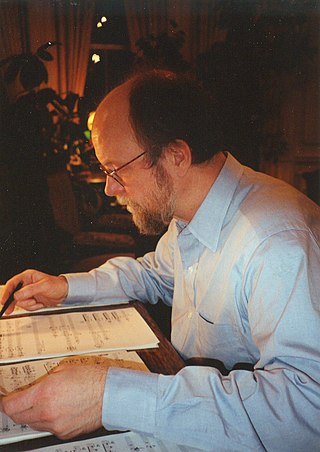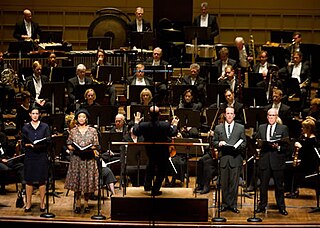James Romig | |
|---|---|
 | |
| Born | August 5, 1971 |
| Education |
|
| Website | www.jamesromig.com |
James Romig (born August 5, 1971) is an American composer. He was a finalist for the 2019 Pulitzer Prize in Music.
James Romig | |
|---|---|
 | |
| Born | August 5, 1971 |
| Education |
|
| Website | www.jamesromig.com |
James Romig (born August 5, 1971) is an American composer. He was a finalist for the 2019 Pulitzer Prize in Music.
James Romig was born August 5, 1971, in Long Beach, California. He earned BM and MA degrees in from the University of Iowa in percussion performance, and a PhD in composition from Rutgers University, where he studied with Charles Wuorinen. He studied additionally with Milton Babbitt, and both Babbitt and Wuorinen served on his dissertation committee. In 2001, after one-year visiting positions at Pittsburg State University and Bucknell University, Romig joined the faculty at Western Illinois University, where he heads the composition/theory area. He lives in Macomb, Illinois, with his wife Ashlee Mack (coordinator of piano instruction at Knox College). [1] [2] [3] [4] [5] [6] [7] [8]

The Pulitzer Prize for Music is one of seven Pulitzer Prizes awarded annually in Letters, Drama, and Music. It was first given in 1943. Joseph Pulitzer arranged for a music scholarship to be awarded each year, and this was eventually converted into a prize: "For a distinguished musical composition of significant dimension by an American that has had its first performance in the United States during the year."

Milton Byron Babbitt was an American composer, music theorist, mathematician, and teacher. He is particularly noted for his serial and electronic music.

Charles Peter Wuorinen was an American composer of contemporary classical music based in New York City. He also performed as a pianist and conductor. Wuorinen composed more than 270 works: orchestral music, chamber music, solo instrumental and vocal works, and operas, such as Brokeback Mountain. His work was termed serialist but he came to disparage that idea as meaningless. Time's Encomium, his only purely electronic piece, received the Pulitzer Prize. Wuorinen taught at several institutions, including Columbia University and the Manhattan School of Music.
Alfred Whitford (Fred) Lerdahl is the Fritz Reiner Professor Emeritus of Musical Composition at Columbia University, and a composer and music theorist best known for his work on musical grammar and cognition, rhythmic theory, pitch space, and cognitive constraints on compositional systems. He has written many orchestral and chamber works, three of which were finalists for the Pulitzer Prize for Music: Time after Time in 2001, String Quartet No. 3 in 2010, and Arches in 2011.
Aaron Jay Kernis is a Pulitzer Prize- and Grammy Award-winning American composer serving as a member of the Yale School of Music faculty. Kernis spent 15 years as the music advisor to the Minnesota Orchestra and as Director of the Minnesota Orchestra's Composers' Institute, and is currently the Workshop Director of the Nashville Symphony Composer Lab. He has received numerous awards and honors throughout his thirty-five year career. He lives in New York City with his wife, pianist Evelyne Luest, and their two children.
David Walter Del Tredici is an American composer. He has won a Pulitzer Prize for Music and is a former Guggenheim and Woodrow Wilson fellow. Del Tredici is considered a pioneer of the Neo-Romantic movement. He has also been described by the Los Angeles Times as "one of our most flamboyant outsider composers".
Mario Davidovsky was an Argentine-American composer. Born in Argentina, he emigrated in 1960 to the United States, where he lived for the remainder of his life. He is best known for his series of compositions called Synchronisms, which in live performance incorporate both acoustic instruments and electroacoustic sounds played from a tape.
Appalachian Spring is a musical composition by Aaron Copland that was premiered in 1944 and has achieved widespread and enduring popularity as an orchestral suite. The music, scored for a thirteen-member chamber orchestra, was created upon commission of the choreographer and dancer Martha Graham with funds from the Coolidge Foundation. It was premiered on Monday, October 30, 1944, at the Library of Congress in Washington D.C., with Martha Graham dancing the lead role. The set was designed by the American sculptor Isamu Noguchi. Copland was awarded the 1945 Pulitzer Prize for Music for his achievement.
The New York New Music Ensemble (NYNME) is an American contemporary music ensemble. Since 1976, the group has commissioned, performed and recorded works by both emerging and prominent living composers. Its performances have been featured at several major music festivals including the Ravinia Festival, the Santa Fe Chamber Music Festival, June in Buffalo, the Pacific Rim Music Festival, and the Thailand International Composition Festival (TICF). NYNME has also been recognized and supported by many significant American foundations, including the Jerome Foundation, the Fromm Foundation at Harvard, the Mary Flagler Cary Foundation, the Mellon Foundation, the Koussevitzky Foundation, and the NEA and NYSCA. The group has held numerous residencies at universities, such as Rice University, Emory University, Brandeis University, the University of Wisconsin–Madison, the University of Pittsburgh, and Princeton's Institute for Advanced Study. Over the years, NYNME has premiered over 140 works, the vast majority of which were written specifically for the group. Among the prominent composers with whom the group has enjoyed longstanding associations are Elliott Carter, Jacob Druckman, Charles Wuorinen, Mario Davidovsky, Harvey Sollberger, Joan Tower, George Perle, Rand Steiger, John Eaton, and David Felder. The group's activities have also included tours in Europe, Asia, and South America.

Steven Edward Stucky was a Pulitzer Prize-winning American composer.

Kenneth Daniel Fuchs is a Grammy Award-winning American composer. He currently serves as Professor of Music Composition at the University of Connecticut in Storrs.
Harold Meltzer is an American composer. Harold is inspired by a wide variety of stimuli, from architectural spaces to postmodern fairy tales and messages inscribed in fortune cookies. In Fanfare Magazine, Robert Carl commented that he "seems to write pieces of scrupulous craft and exceptional freshness, which makes each seem like an important contribution." The first recording devoted to his music, released in 2010 by Naxos on its American Classics label, was named one of the CDs of the year in The New York Times and in Fanfare; new all-Meltzer recordings will issue from Open G Records (2017), Bridge Records (2018), and BMOP/Sound (2019). A Pulitzer Prize Finalist in 2009 for his sextet Brion, Meltzer has been awarded the Rome Prize, the Barlow Prize;, a Guggenheim Fellowship, and both the Arts and Letters Award in Music and the Charles Ives Fellowship from the American Academy of Arts and Letters.
The Group for Contemporary Music is an American chamber ensemble dedicated to the performance of contemporary classical music. It was founded in New York City in 1962 by Joel Krosnick, Harvey Sollberger and Charles Wuorinen and gave its first concert on October 22, 1962 in Columbia University's MacMillin Theatre. Krosnik left the ensemble in 1963. It was the first contemporary music ensemble based at a university and run by composers.
The Ucross Foundation, located in Ucross, Wyoming, is a nonprofit organization that operates an internationally known retreat for visual artists, writers, composers, and choreographers working in all creative disciplines.
Alan Feinberg is an American classical pianist. He has premiered over 300 works by such composers as John Adams, Milton Babbitt, John Harbison, Charles Ives, Steve Reich, and Charles Wuorinen, as well as the premiere of Mel Powell's Pulitzer Prize winning Duplicates. He is an experienced performer of both classical and contemporary music and is well known for recitals that pair old and new music.
Paul Zukofsky was an American violinist and conductor known for his work in the field of contemporary classical music.
Jane O'Leary is an American-born Irish musician and composer who has been living in Ireland since 1972.

Anton Rovner is a Russian-American composer, music critic and theorist.
Lei Liang is a Chinese-born American composer who was a winner of the Grawemeyer Award and a Finalist for the Pulitzer Prize in Music. He is Chancellor's Distinguished Professor of Music at the University of California, San Diego.
Bernard Zaslav was an American viola soloist and chamber musician with an extensive recording and performance career. A founding member of The Composers Quartet in 1965, he went on to play with the Fine Arts Quartet, Vermeer Quartet, and the Stanford String Quartet. He has also performed and recorded as the Zaslav Duo with his wife, pianist Naomi Zaslav.